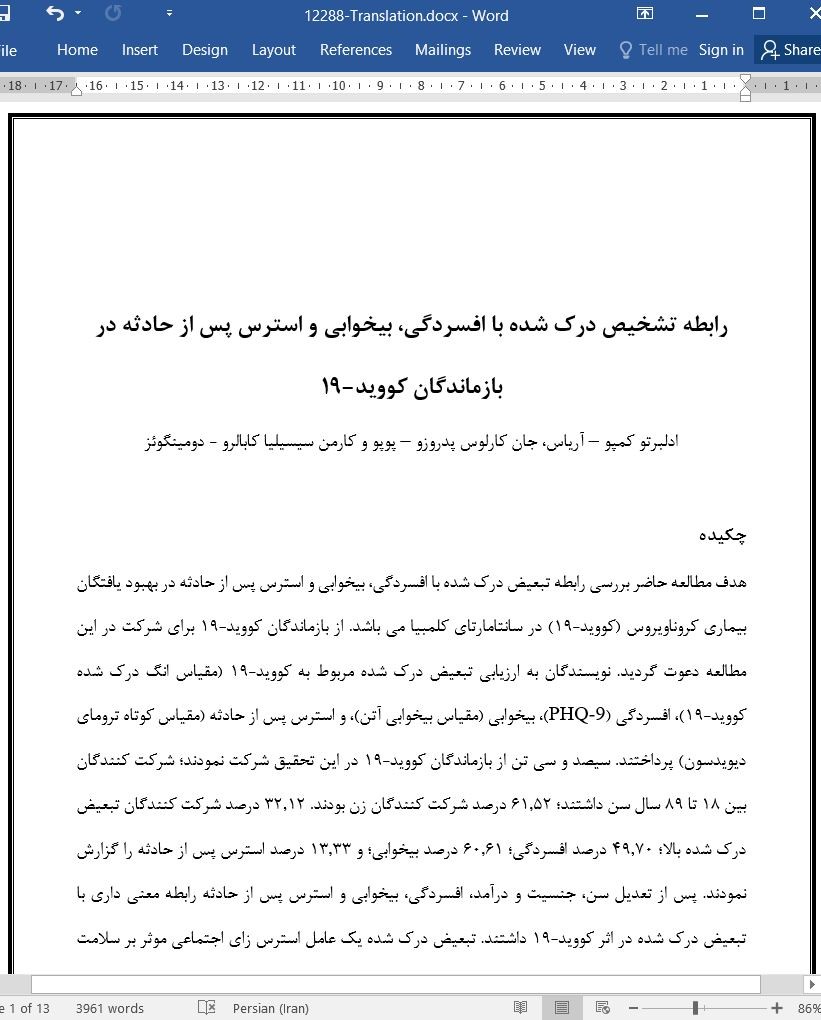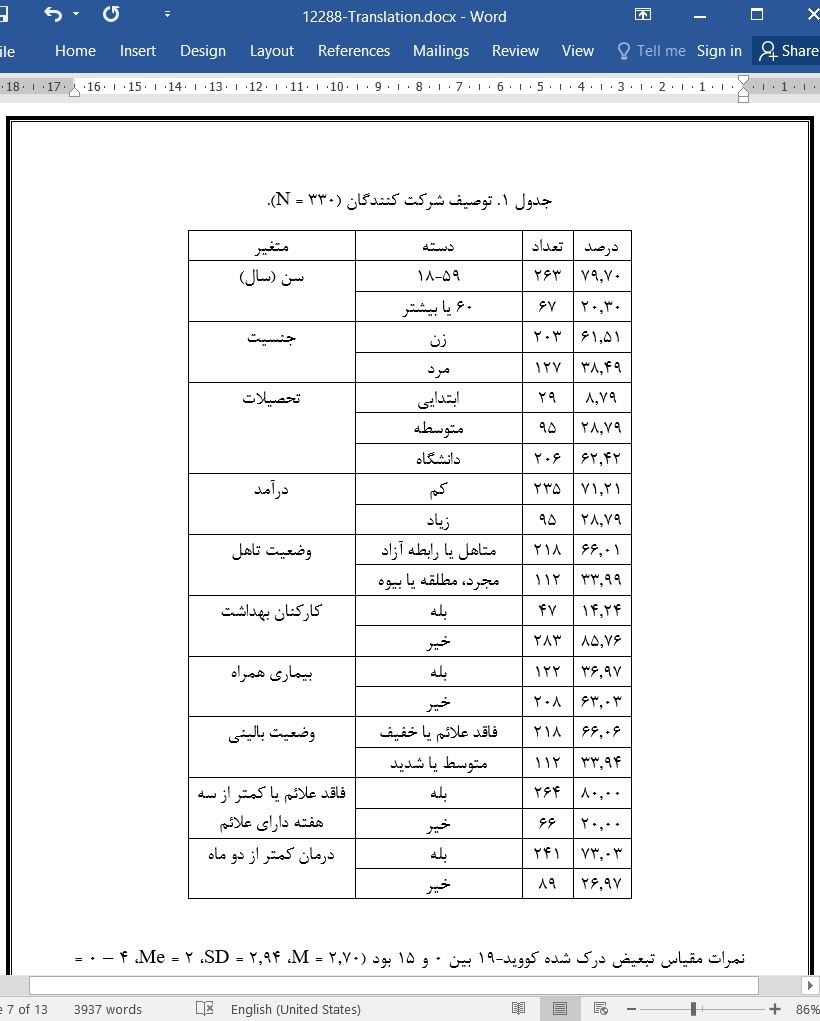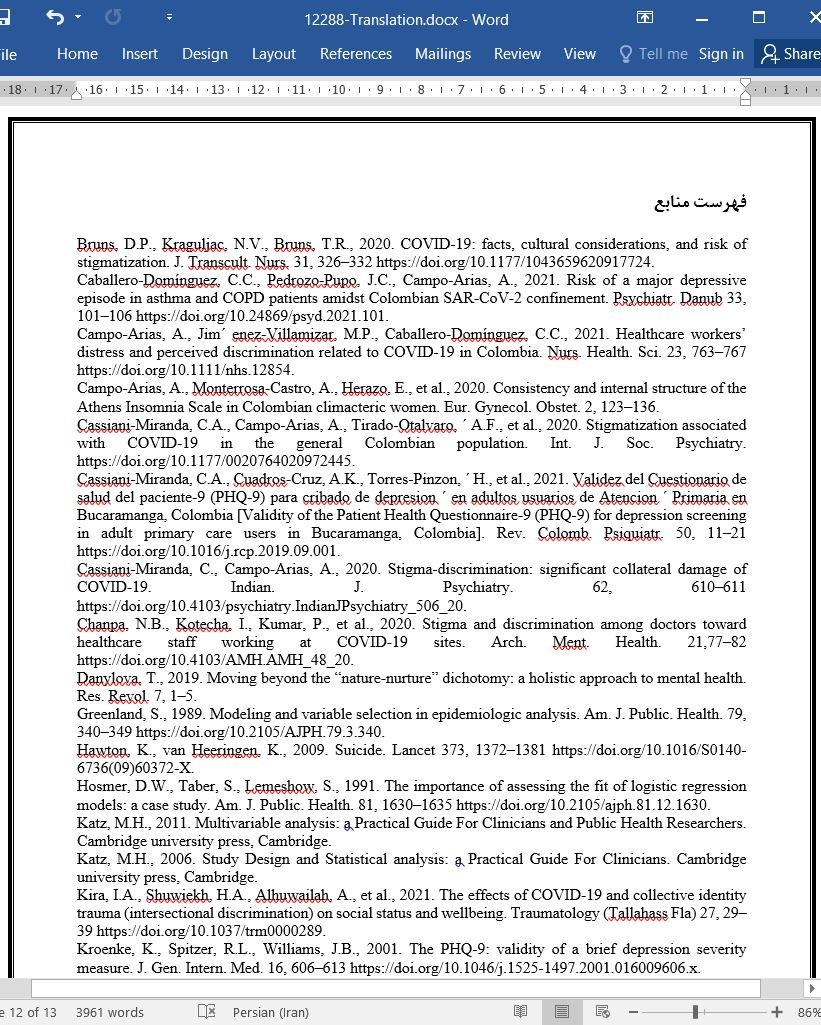
رابطه تشخیص درک شده با افسردگی، بیخوابی و استرس پس از حادثه
چکیده
هدف مطالعه حاضر بررسی رابطه تبعیض درک شده با افسردگی، بیخوابی و استرس پس از حادثه در بهبود یافتگان بیماری کروناویروس (کووید-19) در سانتامارتای کلمبیا می باشد. از بازماندگان کووید-19 برای شرکت در این مطالعه دعوت گردید. نویسندگان به ارزیابی تبعیض درک شده مربوط به کووید-19 (مقیاس انگ درک شده کووید-19)، افسردگی (PHQ-9)، بیخوابی (مقیاس بیخوابی آتن)، و استرس پس از حادثه (مقیاس کوتاه ترومای دیویدسون) پرداختند. سیصد و سی تن از بازماندگان کووید-19 در این تحقیق شرکت نمودند؛ شرکت کنندگان بین ۱۸ تا ۸۹ سال سن داشتند؛ 61.52 درصد شرکت کنندگان زن بودند. 32.12 درصد شرکت کنندگان تبعیض درک شده بالا؛ 49.70 درصد افسردگی؛ 60.61 درصد بیخوابی؛ و 13.33 درصد استرس پس از حادثه را گزارش نمودند. پس از تعدیل سن، جنسیت و درآمد، افسردگی، بیخوابی و استرس پس از حادثه رابطه معنی داری با تبعیض درک شده در اثر کووید-19 داشتند. تبعیض درک شده یک عامل استرس زای اجتماعی موثر بر سلامت روانی بهبود یافتگان کووید-19 محسوب می شود. در پیگیری این گروه از بیماران، بررسی تاثیر تبعیض درک شده بر سلامت روانی حائز اهمیت می باشد.
4. نتیجه گیری
نتیجه گیری شد که تبعیض درک شده عامل استرس زای اجتماعی است که بر یک سوم بازماندگان کووید-19 تاثیر گذاشته و رابطه معنی داری با افسردگی، اختلال استرس پس از حادثه و بیخوابی دارد. بررسی تاثیر تبعیض بر سلامت روانی در هنگام نظارت بر بازماندگان کووید-۱۹ اهمیت بسیاری دارد. تحقیقات آتی باید رابطه بین تبعیض مرتبط با کووید-۱۹ و سایر علائم آشفتگی روانی نظیر: اضطراب و جسمانی سازی را مورد ارزیابی قرار دهند.
Abstract
The study's objective was to study the association of perceived discrimination with depression, insomnia and post-traumatic stress in people recovered from coronavirus disease (COVID-19) in Santa Marta, Colombia. COVID-19 survivors were invited to participate. The authors measured perceived discrimination related to COVID-19 (COVID-19 Perceived Stigma Scale), depression (PHQ-9), insomnia (Athens Insomnia Scale), and post-traumatic stress (Brief Davidson Trauma Scale). Three hundred thirty COVID-19 survivors participated in the research; the participants were between 18 and 89 years; 61.52% were females. 32.12% of the participants reported high perceived discrimination; 49.70%, depression; 60.61%, insomnia; and 13.33% post-traumatic stress. After adjusting for age, gender, and income, depression, insomnia, and post-traumatic stress were associated significantly with discrimination perceived by COVID-19. Perceived discrimination is a social stressor that affects the psychological well-being of people recovered from COVID-19. In the follow-up of this group of patients, it is important to consider the impact of perceived discrimination on psychological well-being.
4. Conclusions
It is concluded that perceived discrimination is a social stressor that affects a third of COVID-19 survivors and is significantly associated with depression, post-traumatic stress disorder, and insomnia. It is crucial to consider the impact of discrimination on psychological well-being when monitoring COVID-19 survivors. Future research should evaluate the relationship between COVID-19-related discrimination and other indicators of psychological distress such as anxiety and somatization.
چکیده
۱. روش
1.1. طرح و شرکت کنندگان
1.2. اندازه گیری
1.2.1. تبعیض درک شده
1.2.2. افسردگی
1.2.3. بیخوابی
1.2.4. استرس پس از حادثه
1.3. روند
1.4. تجزیه و تحلیل داده ها
1.5. ملاحظات اخلاقی
2. نتایج
3. بحث
3.1. پیامدهای عملی
3.2. نقاط قوت و محدودیت های مطالعه
4. نتیجه گیری
5. نقش آفرینی
بیانیه تضاد منافع
بیانیه دسترسی به داده ها
تقدیر و تشکر
فهرست منابع
Abstract
1. Method
1.1. Design and participants
1.2. Measurements
1.2.1. Perceived discrimination
1.2.2. Depression
1.2.3. Insomnia
1.2.4. Post-traumatic stress
1.3. Procedure
1.4. Data analysis
1.5. Ethical considerations
2. Results
3. Discussion
3.1. Practical implications
3.2. Study strengths and limitations
4. Conclusions
5. Contributors
Declaration of Competing Interest
Data availability statement
Acknowledgements
References
- اصل مقاله انگلیسی با فرمت ورد (word) با قابلیت ویرایش
- ترجمه فارسی مقاله با فرمت ورد (word) با قابلیت ویرایش، بدون آرم سایت ای ترجمه
- ترجمه فارسی مقاله با فرمت pdf، بدون آرم سایت ای ترجمه



